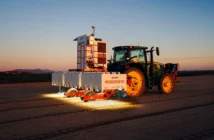Cereals will give growers their first chance to see the updated Fendt Rogator Gen 2. The self-propelled sprayer features improved electronic, pneumatic nozzle bodies, Banjo plumbing connections and valves, and the ContiRinse system to improve accuracy and reduce downtime.
“Customers have driven our decision to increase machine output and overcome some of the restrictions self-propelled sprayers face when it comes to difficult conditions. The improved OptiNozzle drift reduction technology will help to increase the number of days operators can safely spray and improve operational efficiency,” says Fendt’s Ed Dennett.
The updates are available on the latest 645, 655 and 665 Rogator with the top model boasting a 6000-litre tank capacity and 307 horsepower engine to operate a 24 or 36 metre working width. All models in the range automatically select nozzle combinations relative to forward speed, which enables optimum nozzle pressure. This, in turn, reduces drift, which is also maintained as forward speed changes.
“The improved boom levelling system means that spray height is optimised at 50 centimetres through the Rogator’s OptiSonic ultrasonic boom,” adds Mr Dennett.
The latest Rogator features a category 4, cab filtration system and Fendt claims new levels of operator comfort. Improvements to boom stability will also offer greater confidence when spraying in difficult conditions.
“As part of our FendtONE operating concept, the Rogator will feel familiar to any Fendt operator. It is also intuitive to operate for operators who have not experienced a Fendt before. The Rogator can share operational data with tractors and other machinery, and the FendtONE offboard system can capture, report and save this data to improve future applications,” says Mr Dennett.
With farm size increasing to grow and operated for long periods, Fendt now offers an eight-year warranty. “We want customers to be able to run their Rogators for longer, to make their operations more sustainable and to provide them with better value over the course of their ownership, concludes Mr Dennett.




